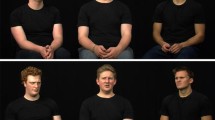Abstract
Two experiments replicated Ekman and Friesen's finding of an expression that signals contempt across cultures. The subjects, from West Sumatra, Indonesia, were members of a culture that differs in a number of ways from Western cultures. In one experiment the subjects judged photographs of Japanese and American faces, both males and females, which showed many different emotions. There was very high agreement about which expressions signaled contempt in preference to anger, disgust, happiness, sadness, fear, or surprise. In a second experiment the Indonesian subjects judged expressions shown by members of their own culture, and again there was very high agreement about which expression signals contempt.
Similar content being viewed by others
References
Ekman, P., & Friesen, W. V. (1976). Measuring facial movement.Environmental Psychology and Nonverbal Behavior, 1 56–75.
Ekman, P., & Friesen, W. V. (1978).Facial Action Coding System: A technique for the measurment of facial movement. Palo Alto: Consulting Psychologists Press.
Ekman, P., & Friesen, W. V. (1986). A new pan-cultural facial expression of emotion.Motivation and Emotion, 10 159–168.
Ekman, P., & Friesen, W. V. (1988). Who knows what about contempt: A reply to Izard and Haynes.Motivation and Emotion, 12 17–22.
Ekman, P., Friesen, W. V., O'Sullivan, M., Chan, A., Diacoyanni-Tarlatzis, I., Heider, K., Krause, R., LeCompte, W. A., Pitcairn, T., Ricci-Bitti, P. E., Scherer, K. R., Tomita, M., & Tzavaras, A. (1987). Universals and cultural differences in the judgments of facial expressions of emotion.Journal of Personality and Social Psychology, 53 712–717.
Feleky, A. M. (1941). The expression of the emotions.Psychological Review, 21 33–41.
Frois-Wittman, J. (1930). The judgment of facial expression.Journal of Experimental Psychology, 13 113–151.
Heider, K. G. (1984).Emotion: Inner state vs. interaction. Paper presented at the meeting of the American Anthropological Association, Denver, Colorado.
Izard, C. E. (1971).The face of emotion. New York: Appleton-Century-Crofts.
Izard, C. E., & Haynes, O. M. (1988). On the form and universality of the contempt expression: A challenge to Ekman and Friesen's claim of discovery.Motivation and Emotion, 12 1–16.
Kato, T. (1982).Matriling and migration. Evolving Minangkabau traditions in Indonesia. Ithaca, NY: Cornell University Press.
Levy, H., & Schlosberg, H. (1960). Woodworth scale values of the Lightfoot pictures of facial expression.Journal of Experimental Psychology, 60 121–125.
Matsumoto, D. R. (1986).Cross-cultural communication of emotion. Unpublished doctoral dissertation, University of California, Berkeley.
Matsumoto, D. R., & Ekman, P. (1988).American-Japanese cultural differences in rating the intensity of facial expressions of emotion. Manuscript submitted for publication.
Tomkins, S. S., & McCarter, R. (1964). What and where are the primary affects? Some evidence for a theory.Perceptual and Motor Skills, 181 119–158.
Woodworth, R. S. (1938).Experimental psychology. New York: Holt.
Author information
Authors and Affiliations
Additional information
This study was supported by a grant from the National Institute of Mental Health (MH 41100). Paul Ekman's work is also supported by a Research Scientist Award from the National Institute of Mental Health (MH 06092). Karl G. Heider's work was supported by a grant from the National Institute of Mental Health (MH 38221). We are grateful to Maureen O'Sullivan for her many helpful comments on this report.
Rights and permissions
About this article
Cite this article
Ekman, P., Heider, K.G. The universality of a contempt expression: A replication. Motiv Emot 12, 303–308 (1988). https://doi.org/10.1007/BF00993116
Issue Date:
DOI: https://doi.org/10.1007/BF00993116




